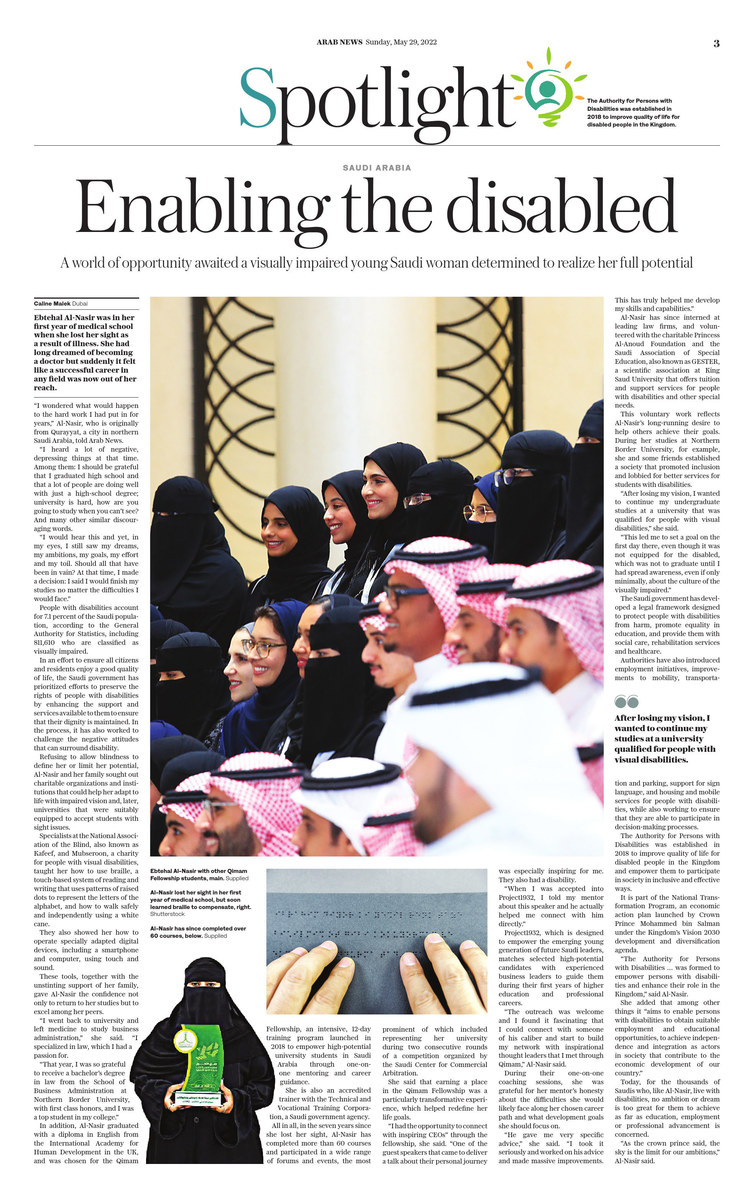DUBAI: Ebtehal Al-Nasir was in her first year of medical school when she lost her sight as a result of illness. She had long dreamed of becoming a doctor but suddenly it felt like a successful career in any field was now out of her reach.
“I wondered what would happen to the hard work I had put in for years,” Al-Nasir, who is originally from Qurayyat, a city in northern Saudi Arabia, told Arab News.
“I heard a lot of negative, depressing things at that time. Among them: I should be grateful that I graduated high school and that a lot of people are doing well with just a high-school degree; university is hard, how are you going to study when you can’t see? And many other similar discouraging words.
“I would hear this and yet, in my eyes, I still saw my dreams, my ambitions, my goals, my effort and my toil. Should all that have been in vain? At that time, I made a decision: I said I would finish my studies no matter the difficulties I would face.”
People with disabilities account for 7.1 percent of the Saudi population, according to the General Authority for Statistics, including 811,610 who are classified as visually impaired,.
In an effort to ensure all citizens and residents enjoy a good quality of life, the Saudi government has prioritized efforts to preserve the rights of people with disabilities by enhancing the support and services available to them to ensure that their dignity is maintained. In the process, it has also worked to challenge the negative attitudes that can surround disability.
Refusing to allow blindness to define her or limit her potential, Al-Nasir and her family sought out charitable organizations and institutions that could help her adapt to life with impaired vision and, later, universities that were suitably equipped to accept students with sight issues.
Specialists at the National Association of the Blind, also known as Kafeef, and Mubseroon, a charity for people with visual disabilities, taught her how to use braille, a touch-based system of reading and writing that uses patterns of raised dots to represent the letters of the alphabet, and how to walk safely and independently using a white cane.

Ebtehal Al-Nasir lost her sight in her first year of medical school, but soon learned braille to compensate. (Shutterstock)
They also showed her how to operate specially adapted digital devices, including a smartphone and computer, using touch and sound.
These tools, together with the unstinting support of her family, gave Al-Nasir the confidence not only to return to her studies but to excel among her peers.
“I went back to university and left medicine to study business administration,” she said. “I specialized in law, which I had a passion for.
“That year, I was so grateful to receive a bachelor’s degree in law from the School of Business Administration at Northern Border University, with first class honors, and I was a top student in my college.”
In addition, Al-Nasir graduated with a diploma in English from the International Academy for Human Development in the UK, and was chosen for the Qimam Fellowship, an intensive, 12-day training program launched in 2018 to empower high-potential university students in Saudi Arabia through one-on-one mentoring and career guidance.
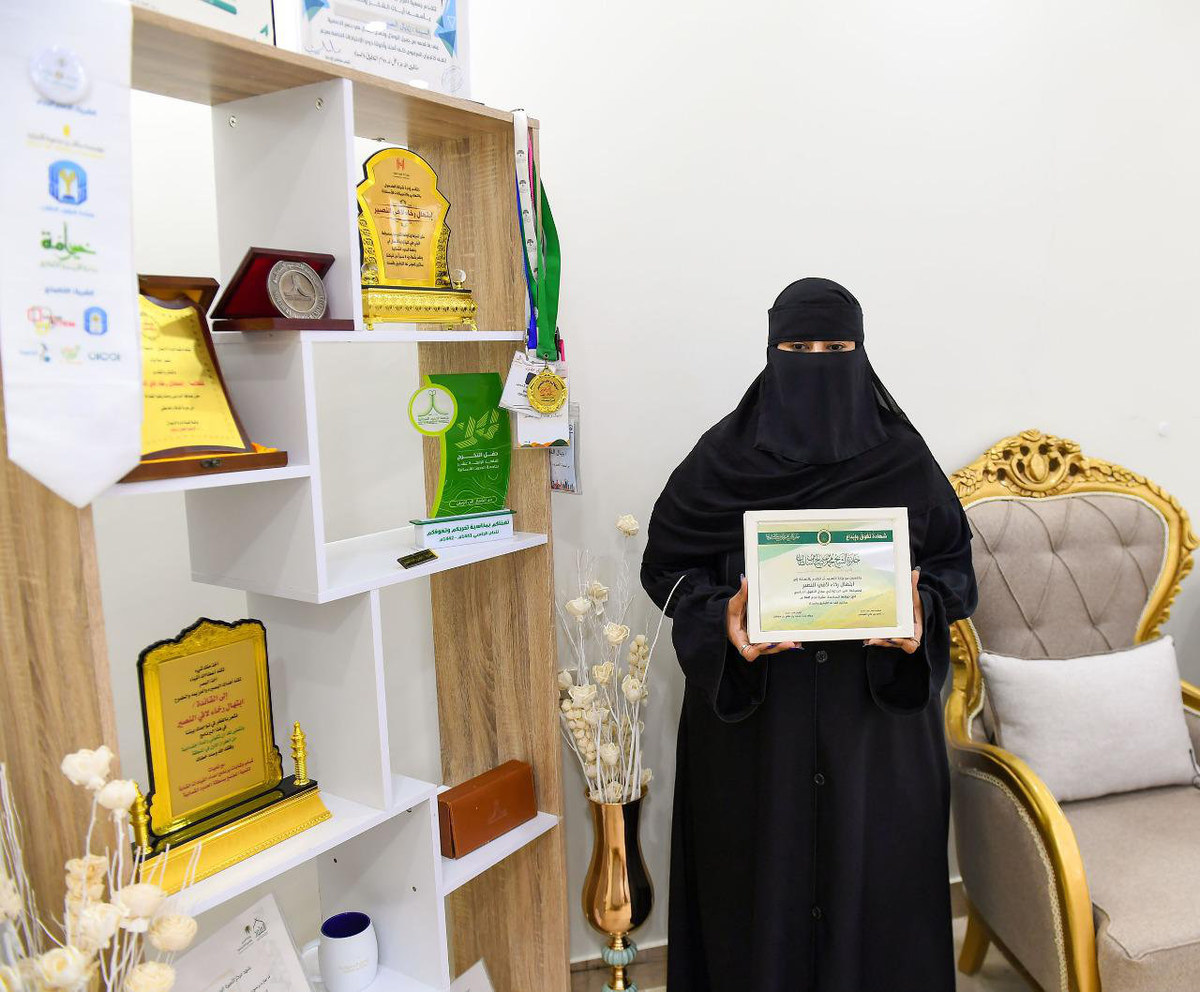
Ebtehal Al-Nasir with a display of some of the numerous awards she has received. (Supplied)
She is also an accredited trainer with the Technical and Vocational Training Corporation, a Saudi government agency.
All in all, in the seven years since she lost her sight, Al-Nasir has completed more than 60 courses and participated in a wide range of forums and events, the most prominent of which included representing her university during two consecutive rounds of a competition organized by the Saudi Center for Commercial Arbitration.
She said that earning a place in the Qimam Fellowship was a particularly transformative experience, which helped redefine her life goals.
“I had the opportunity to connect with inspiring CEOs” through the fellowship, she said. “One of the guest speakers that came to deliver a talk about their personal journey was especially inspiring for me. They also had a disability.
“When I was accepted into Project1932, I told my mentor about this speaker and he actually helped me connect with him directly.”
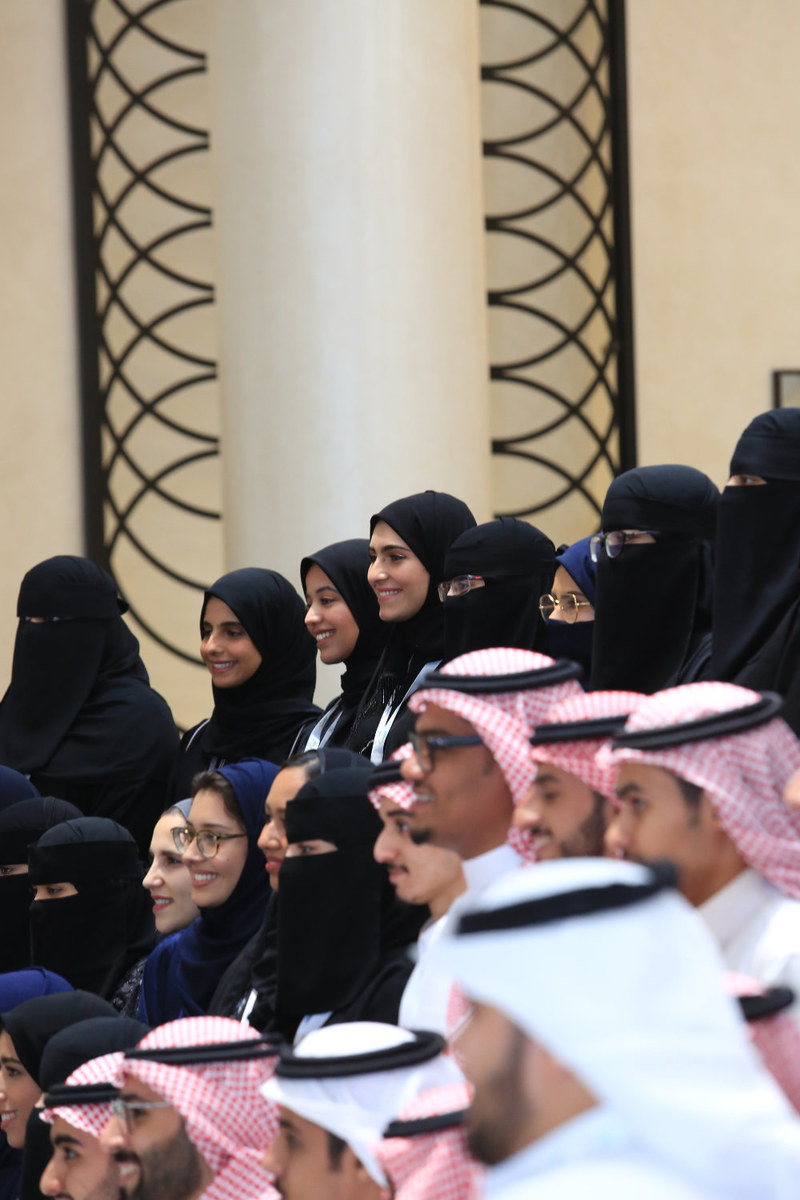
Ebtehal Al-Nasir with other Qimam Fellowship students. (Supplied)
Project1932, which is designed to empower the emerging young generation of future Saudi leaders, matches selected high-potential candidates with experienced business leaders to guide them during their first years of higher education and professional careers.
“The outreach was welcome and I found it fascinating that I could connect with someone of his caliber and start to build my network with inspirational thought leaders that I met through Qimam,” Al-Nasir said.
During their one-on-one coaching sessions, she was grateful for her mentor’s honesty about the difficulties she would likely face along her chosen career path and what development goals she should focus on.
“He gave me very specific advice,” she said. “I took it seriously and worked on his advice and made massive improvements. This has truly helped me develop my skills and capabilities.”
Al-Nasir has since interned at leading law firms, and volunteered with the charitable Princess Al-Anoud Foundation and the Saudi Association of Special Education, also known as GESTER, a scientific association at King Saud University that offers tuition and support services for people with disabilities and other special needs.
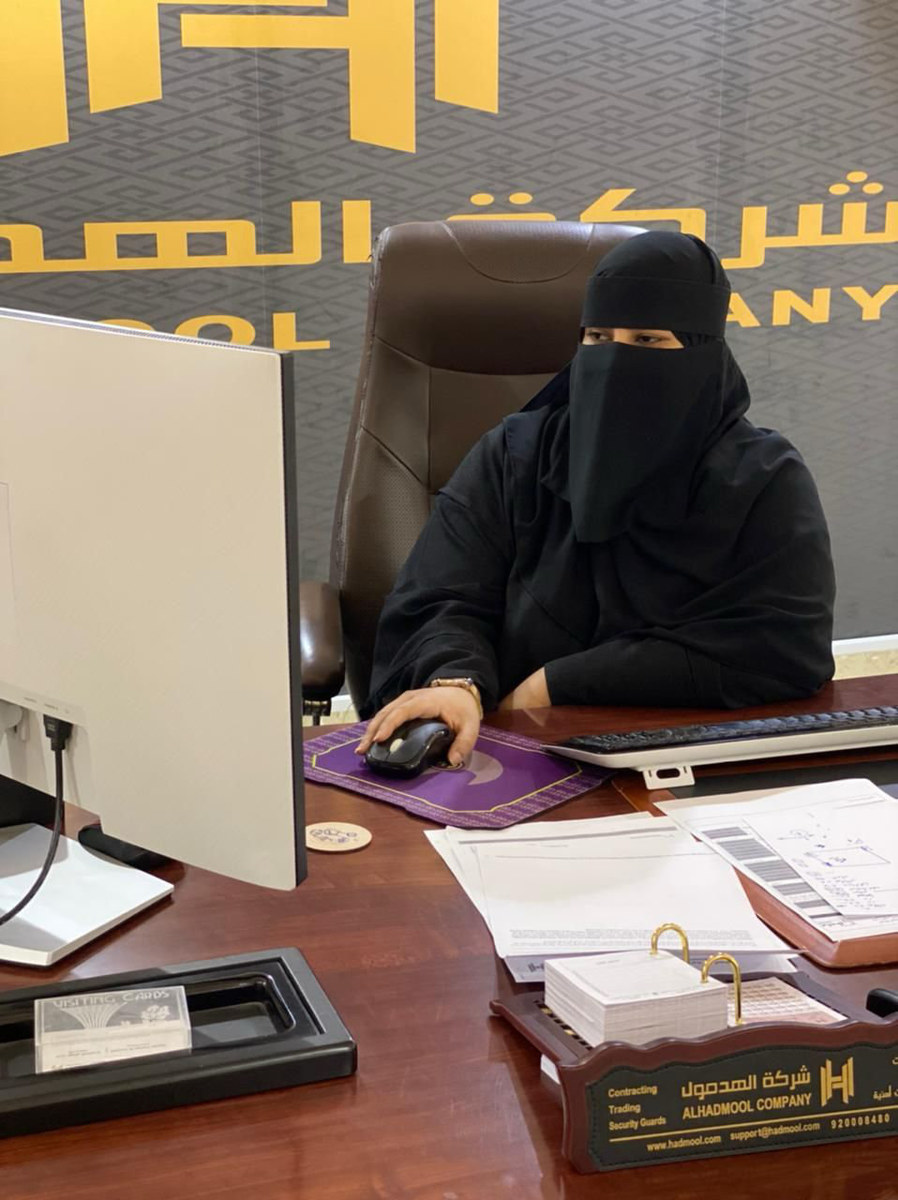
Ebtehal Al-Nasir has been rendering voluntary work to help other students with disabilities. (Supplied)
This voluntary work reflects Al-Nasir’s long-running desire to help others achieve their goals. During her studies at Northern Border University, for example, she and some friends established a society that promoted inclusion and lobbied for better services for students with disabilities.
“After losing my vision, I wanted to continue my undergraduate studies at a university that was qualified for people with visual disabilities,” she said.
“This led me to set a goal on the first day there, even though it was not equipped for the disabled, which was not to graduate until I had spread awareness, even if only minimally, about the culture of the visually impaired.”
The Saudi government has developed a legal framework designed to protect people with disabilities from harm, promote equality in education, and provide them with social care, rehabilitation services and healthcare.
Authorities have also introduced employment initiatives, improvements to mobility, transportation and parking, support for sign language, and housing and mobile services for people with disabilities, while also working to ensure that they are able to participate in decision-making processes.
The Authority for Persons with Disabilities was established in 2018 to improve quality of life for disabled people in the Kingdom and empower them to participate in society in inclusive and effective ways.
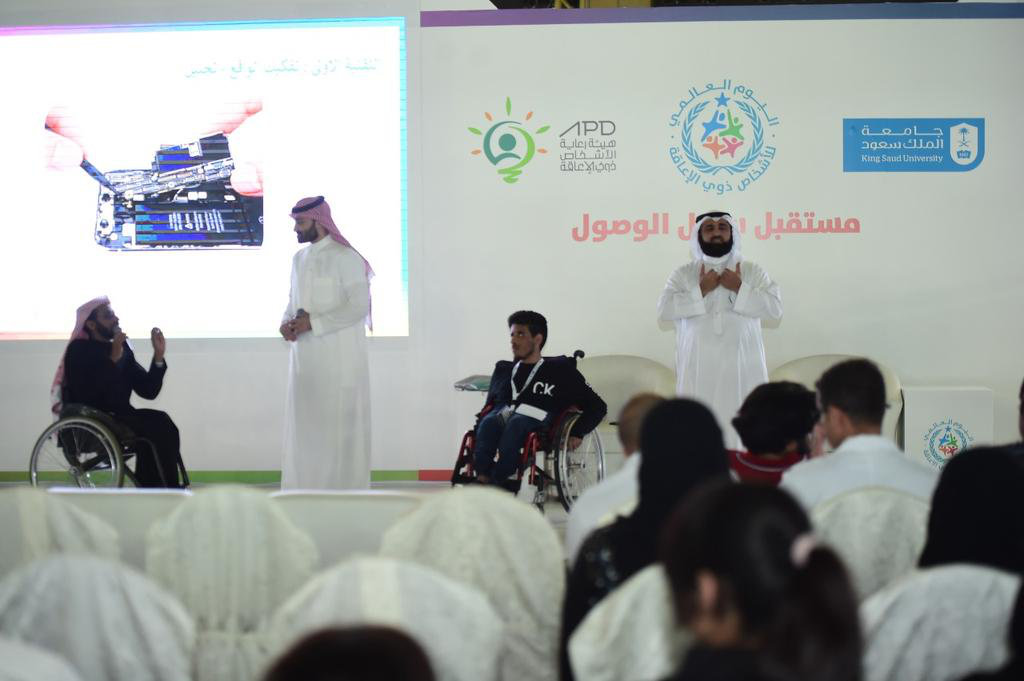
Saudi Arabia's Authority for Persons with Disabilities is tasked with empowering citizens with disabilities "to participate in society in inclusive and effective ways." (APD photo)
It is part of the National Transformation Program, an economic action plan launched by Crown Prince Mohammed bin Salman under the Kingdom’s Vision 2030 development and diversification agenda.
“The Authority for Persons with Disabilities … was formed to empower persons with disabilities and enhance their role in the Kingdom,” said Al-Nasir.
She added that among other things it “aims to enable persons with disabilities to obtain suitable employment and educational opportunities, to achieve independence and integration as actors in society that contribute to the economic development of our country.”
Today, for the thousands of Saudis who, like Al-Nasir, live with disabilities, no ambition or dream is too great for them to achieve as far as education, employment or professional advancement is concerned.
“As the crown prince said, the sky is the limit for our ambitions,” Al-Nasir said.
